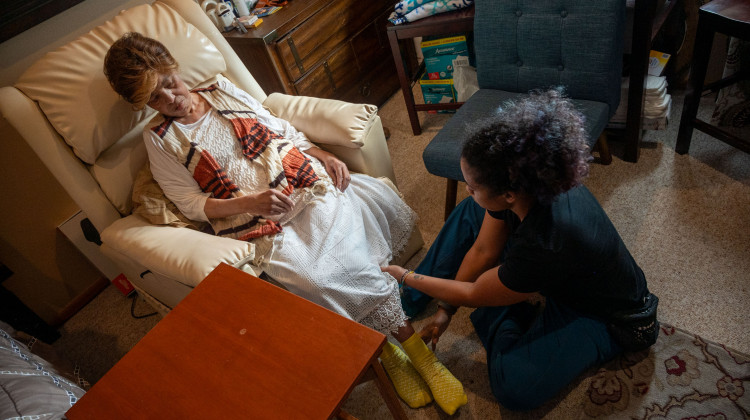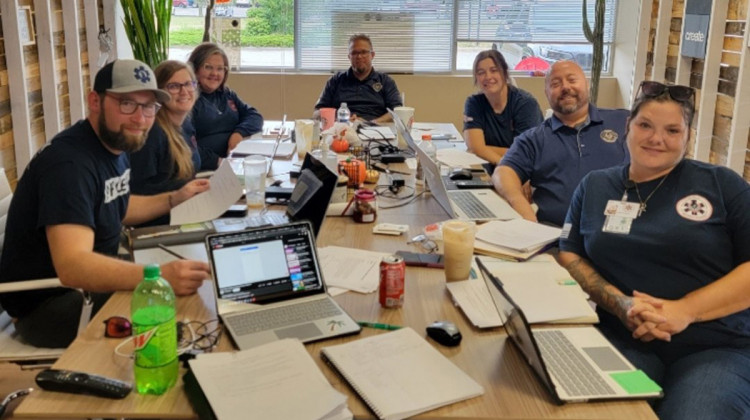In February of 2012, about 25 administrators from long-term care facilities began learning how to provide better, individualized care for their residents and how to create a more empowering and satisfying work culture for their staff by taking part in the Central Indiana Leadership Collaborative for Nursing Homes.
The collaborative is helping to de-institutionalize the feel of Central Indiana nursing homes. Increasingly, meals are served with nice place settings instead of with disposable utensils on trays and residents are given more choices for their meals instead of everyone being served the same thing. Collaborative facilitator Cathie Brady of B & F Consulting says she encourages nursing home administrators to look at what their own needs are and then determine how to meets those same needs for their residents. She says residents of nursing homes are no different than anyone else.
Co-facilitator Barb Frank says a big issue for many facilities is being prepared for new admissions. Frank says if the staff is unaware a new resident is coming, it’s very disheartening for them to be put in a position of caring for someone when they don’t know their name or their needs. Frank says new residents aren’t always well and can be scared – so being expected and warmly welcomed is important.
“It makes not just the resident’s day and the family’s day but the staff’s day as well,” Frank says.
Employee turnover is a big problem. Certified nurse aides – or CNA’s – are the frontline staffers who help feed, bathe and care for residents. Rod Jackson, the administrator of Franklin United Methodist Community, has openings for 22 CNAs. He says the turnover is great because many are dealing with their own issues.
“There’s sometimes money, there’s sometimes benefits and daycare and so forth and so on," Jackson says. "What we need to do is figure out what the CNA actually needs in order to better ourselves to provide for them.”
Brenda McLane with Ivy Tech Corporate College says consistent care is important for nursing home residents.
“It can be discomforting for the patient too, to have all that turnover. They like to get to know their CNA and know the people that are working with them," McLane says. "So, it’s important to have a stable relationship.”
McLane says Ivy Tech’s CNA program includes classroom training and then mentoring from a nurse on the job.
Frank says hiring goes beyond what is on a resume.
“We encourage people to hire for character – skills can be taught," Frank says. "But when you hire for character, you have to have good character as an organization in terms of how you welcome people in and how you respect what they know and what they bring.”
Rod Jackson says it takes a caring person to work with people in long-term care.
“You need to love this industry. You need to love the elderly," he says. "You need to have a passion for this – and if you don’t, don’t go into this business.”
Facilitator Cathie Brady, says having an empowered staff leads to success.
“If you have happy staff – you have happy residents,” she says. “So really try to put your emphasis on trying to make the work experience one that is a good experience for people where they’re looking forward to coming into work instead of dreading it.”
Bill Pierce of Heritage House in Shelbyville didn’t expect much when he signed up for the collaborative to meet continuing education requirements.
“When I came I was pleasantly surprised at how much of an impact this had on me – because they gave me a different way of thinking about some the processes that had almost become common place," he says. "By taking a step back and looking at our processes – we kind of threw out the old systems.”
According to Pierce, learning new concepts has invigorated his staff. He says his management team and the direct caregivers seem much more invested because they’re seeing the progress. Networking and sharing best practices with people he once considered competitors has changed Heritage House for the better," he says.
“We’ve achieved more in the last six months than probably in the last 2 or 3 years as far as rethinking some of our systems and getting good outcomes from it," Pierce says.
Many stakeholders, from the Indiana State Department of Health to AARP to nursing home associations to universities, have supported the collaborative as a way to improve quality care.
 DONATE
DONATE









 Support WFYI. We can't do it without you.
Support WFYI. We can't do it without you.